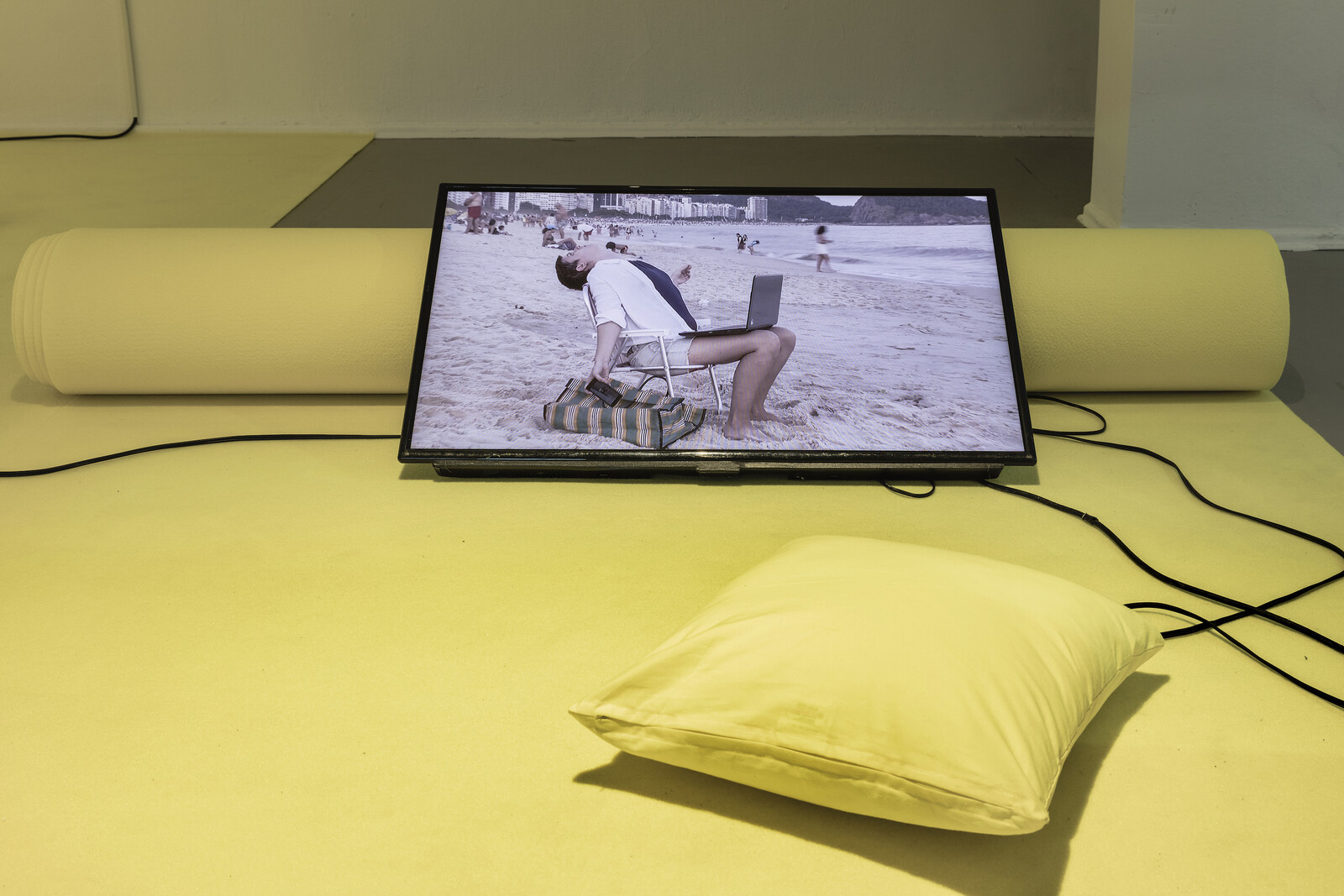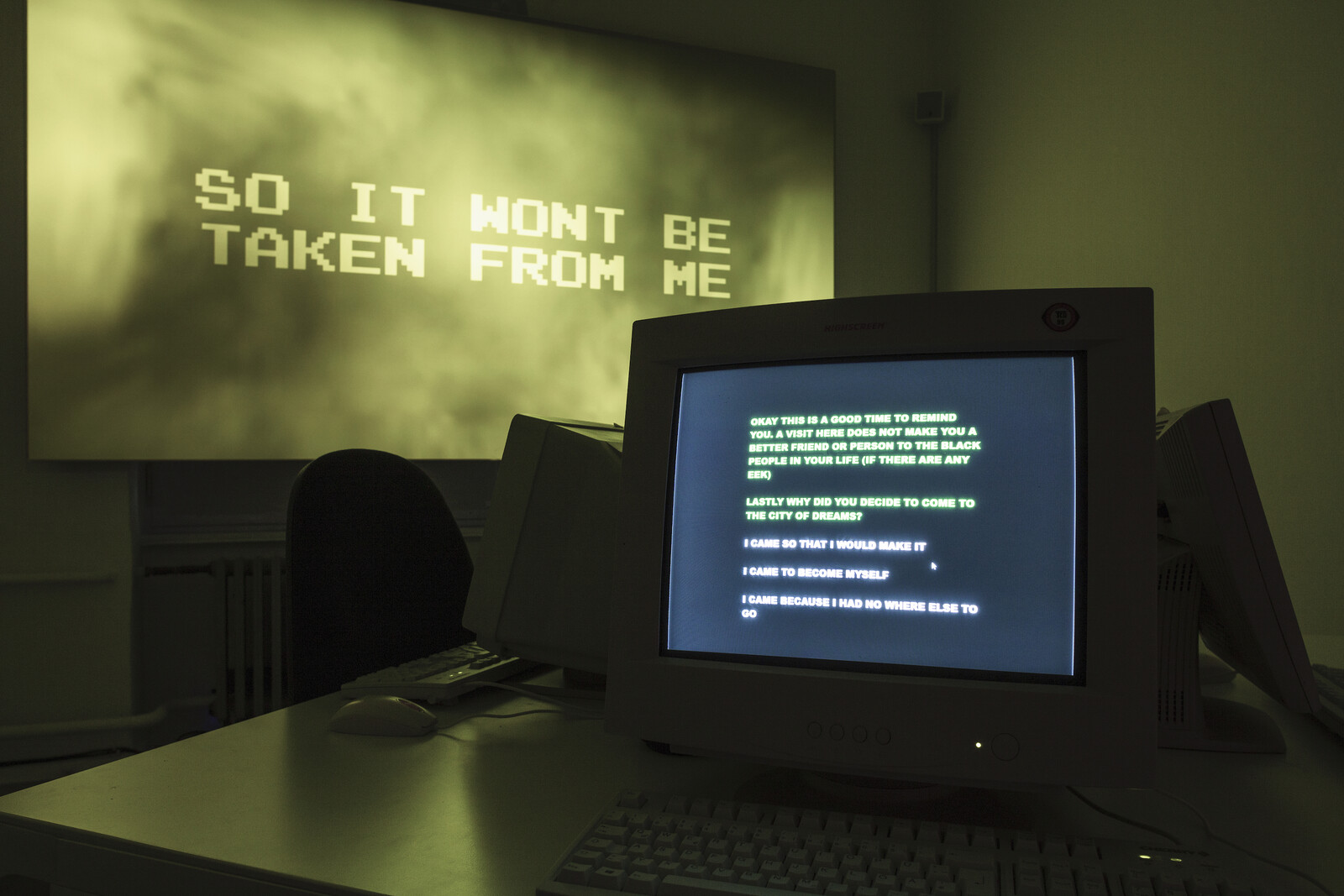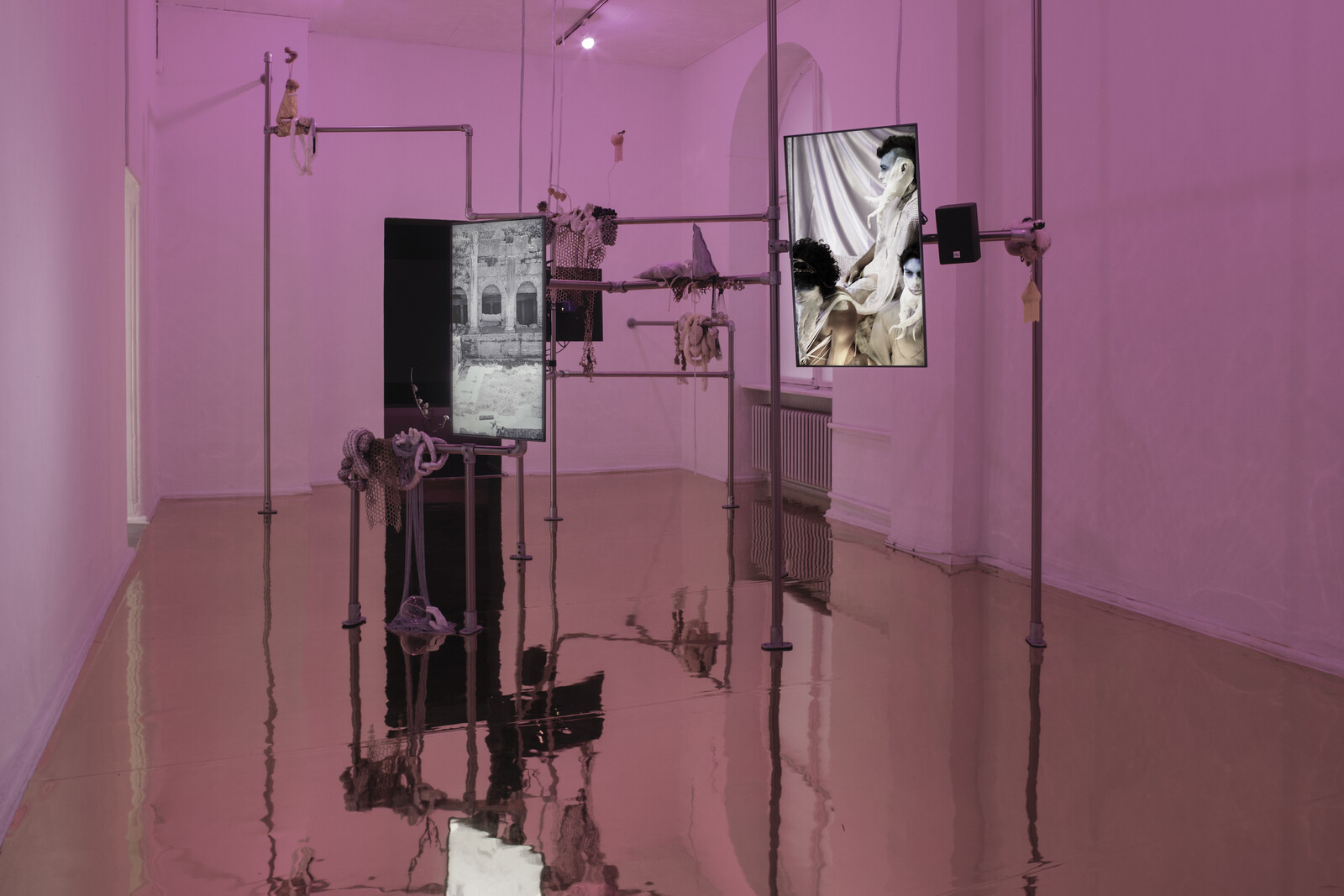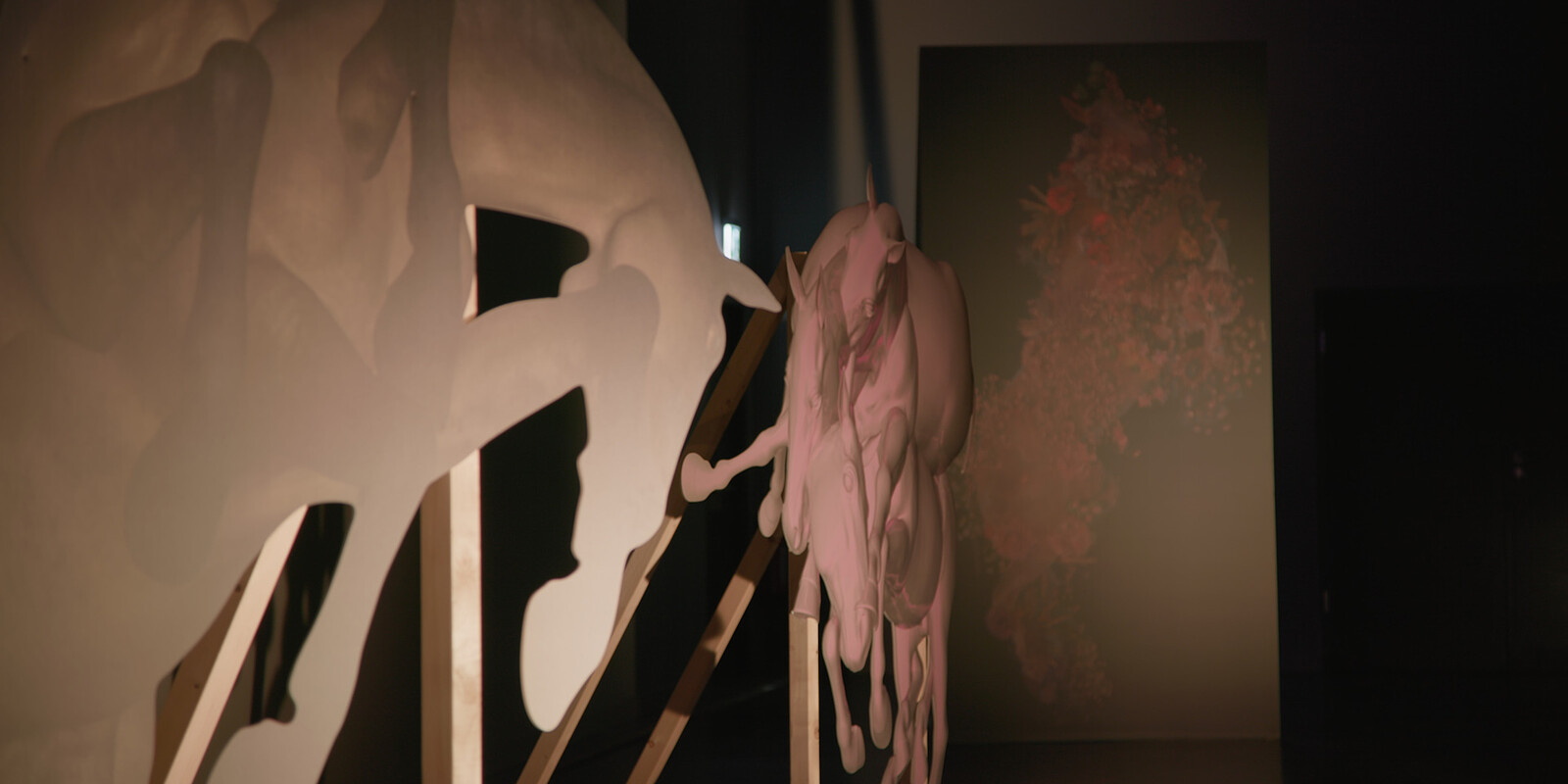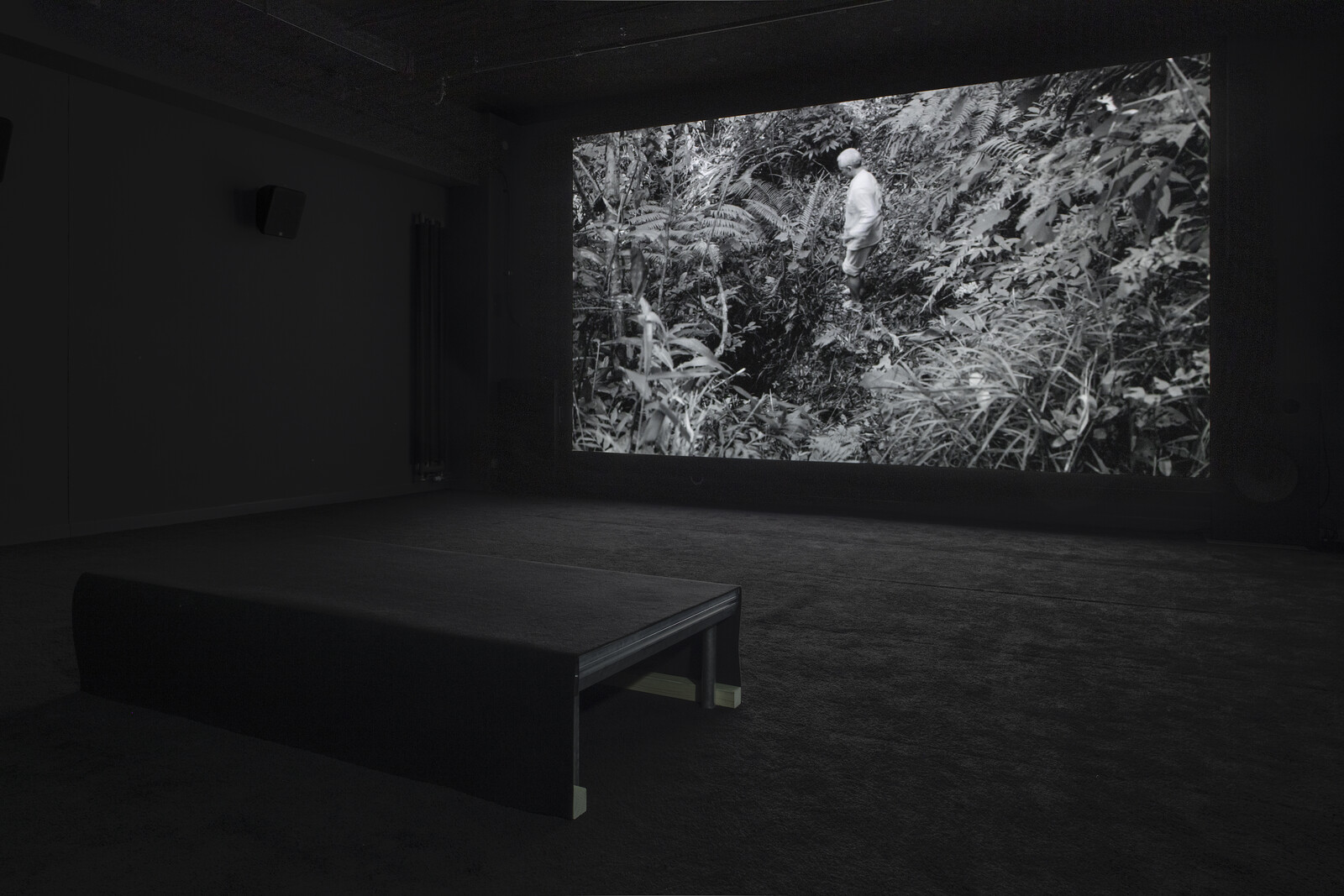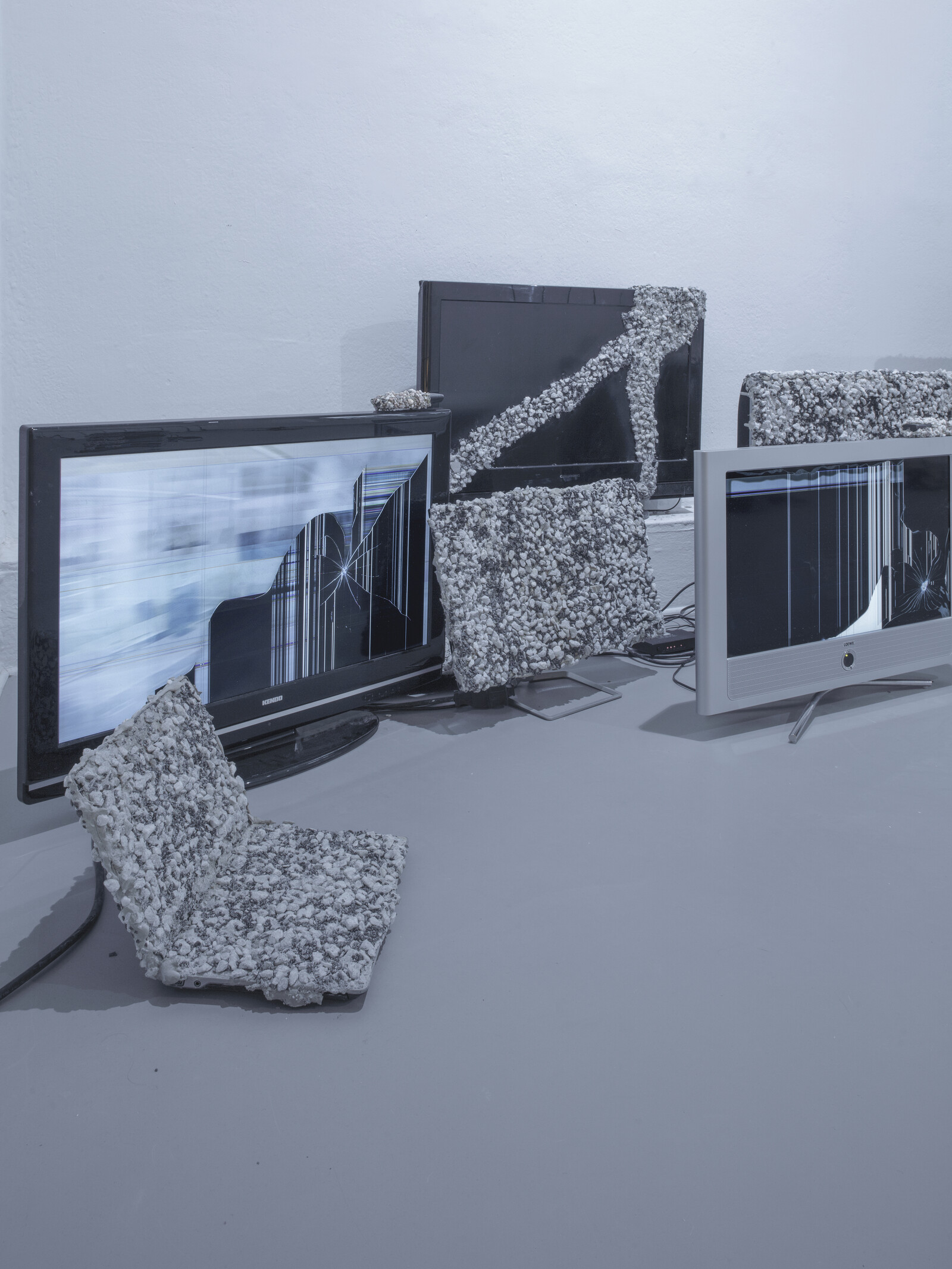January 28–March 28, 2021
Sitting at my desk in London in front of my MacBook, I join a Zoom meeting where I look at four chunky, gray mid-2000s computers arranged on a table in an exhibition space in Berlin. The old computers, grouped in a way that brings to mind an internet café, are there for visitors to play a video game by Danielle Brathwaite-Shirley, I Can’t Remember a Time I Didn’t Need You (2020). But there is no one there to play: the two exhibitions in this year’s edition of art and digital culture festival Transmediale opened in a locked-down Berlin. I am taking part in a virtual proxy tour of Kunstraum Kreuzberg/Bethanien. The guide, Annina Guntli, sets her phone to selfie mode and we can see each other and talk for a quick minute. She then turns it around and walks me through the show.
Using the chat function, she sends me links to excerpts of the videos on view and Brathwaite-Shirley’s game, which I play a day later. It begins with a message and a trigger warning: “This archive centers Black trans people. Those that are not Black and trans may feel uncomfortable. TW: there are themes of loss within the archive.” It’s a choose-your-own-adventure, text-based game, but before you access it you have to go through a registration office where “your identity will be determined,” since the experience of the game is determined by how you identify. The early-internet aesthetic, with all-caps letters in neon green against a dark background, and the grating sound join a narrative that can be demanding—“acknowledge your privilege,” and “this is not for you”—and it seems easier to play it from home, without raising my eyes sheepishly to see if other people also feel like they are challenged more directly than they usually are in an exhibition space.1
Had I been in Kunstraum Kreuzberg/Bethanien, rather than on a digital tour, walking away from the dark city in Brathwaite-Shirley’s game would have led me to a room with a golden floor. (I catch my guide’s reflection for a second in the installation on view there, Madison Bycroft’s Ruses and Refusals [2019], where four screens unfold a story of unlikely meetings, including actor and director Buster Keaton, medieval writer and mystic Julian of Norwich, and Greek philosopher Diogenes.) Every work in this exhibition space is presented in its own room, the eight artists on view each using the roomsize installations differently. Sofia Caesar’s 2019 series of four video self-portraits “Workation”—depicting the artist on “workation,” sitting by the beach or on a lush balcony working away on her laptop—are presented in a room covered in yellow fabric, with bright daffodil-hued pillows strewn on the floor. The installation is inviting and warm, sustaining the illusion of digital nomadism, a world where technology released workers from their desks so work can be “fun.”
Caesar’s reproduction-critique of the idle promises of capitalism, displayed in an empty room during a pandemic in which working from home feels more like working nonstop or living at work, may sound haunting. Yet Laura Yuile’s installation Heavy View (2020) feels even more like a sign of the times. A collection of disused screens and monitors covered in pebbles, they display architectural renderings of empty office spaces and suburban lots—desolate, gray, and expired—which remind me of people on social media imagining the dead plants in the office spaces they left behind. There’s another empty architectural rendering on view, only this one displays another kind of loss: in Bassam Al-Sabah’s video Fenced within the silent cold walls (2018), the home his family left behind when fleeing Iraq is reconstructed from memory and accompanied by the artist’s grandmother speaking in Arabic, remembering how she burned all the family photographs before leaving. As the image floats through the rendered domestic space, blobby animations populate it—they rest on the couches, emerge from the sink like dark snakes—tinting the work with unexpected quick motion, pointing perhaps to the impossibility of filling in for what is forgotten, or simply adding an ominous tinge of the present onto the unidealized past.
This edition of Transmediale is titled “for refusal.” The exhibition component, “Rendering Refusal,” is accompanied by an online program, “Almanac for Refusal,” which includes screenings, texts, talks, and other programs unfolding over the next year, culminating in the 2022 edition. The online program adds to the exhibition, with further works and contexts expanding the ideas in the show. The keynote talk, for example, is by media theorist, poet, and designer Jason Edward Lewis, exploring different meeting points between computation and Indigeneity. Transmediale, which has focused on digital culture for over thirty years, could offer a prism to assess the current, necessitated translation of culture into online space, without technological solutionism but by involving a community of people who have thought complexly about a digital context before every gallery had an online showroom.
The proxy visits are meant to provide a social space; instead of replicating the experience of the work, they attempt to recreate the experience of coming together to view it. My tour of the second physical exhibition at Betonhalle was with Nora O Murchú, artistic director of Transmediale. When we chat, her face is basked in pink light from one side of the exhibition; the other end is lit neon green. When I ask about the exhibition design, she explains that it was meant to reflect an investment in a different kind of reality. It transforms the space but in light of, well, reality, these words feel insufficient. Did I actually see this exhibition?
“For refusal” is a topic so large it could suggest or encompass anything. An attitude more than a subject, it can be hard to see how it links to individual works. But the five works on view at Betonhalle feel like they speak to the show’s ideas more directly. Jennifer Mehigan’s Creamatorium (2020) is a mixed-media installation that suggests how, under English occupation, cemeteries became ad-hoc spaces of social contact in Ireland. The work encompasses histories, personal accounts, and local legends. Sung Tieu’s 2017 video installation Memory Dispute explores the ecosystem of a rainforest in Vietnam, damaged forever by napalm. And Eli Cortiñas’s video installation Not Gone With The Wind (2020) brings together videos collated from the web, edited quickly in a succession of images that move from an Olympic long-distance jump to Black Lives Matter demonstrations, to ask about the power of images to transform us, and how narrative is constructed. It’s an easy argument that these works more directly render politics, but then, just remembering a house one was exiled from is also a form of refusal.
Sitting at my desk, I ask someone I’ve never met what it feels like to stand in a room with walls painted yellow. I ask her about her experience of the artworks as a way of committing to this awkward social space, and don’t linger on the question of whether this is a solution to the problem of an exhibition that may open and close like a hazy dream of other places and spaces and times. When I reflect on what I miss about seeing art and other cultural experiences, from going to the movies to watching a performance, I think about being in a space with other people, sneaking a glance at those next to me in the cinema to see if they are also shedding a tear, or wondering if my discomfort in front of a demanding artwork is something that could be shared. There is little point, I guess, in dwelling on a world of yesterday. Instead, I talk to Annina about the warm sunshine of Caesar’s installation. We do what we can.
Frances Whorrall-Campbell discusses Danielle Brathwaite-Shirley’s work in a recent feature on digital art and trans archives: https://www.art-agenda.com/features/370443/digital-art-and-trans-archiving.
